
English (961)
Children categories
BRAC Haiti Celebrates International Women's Day
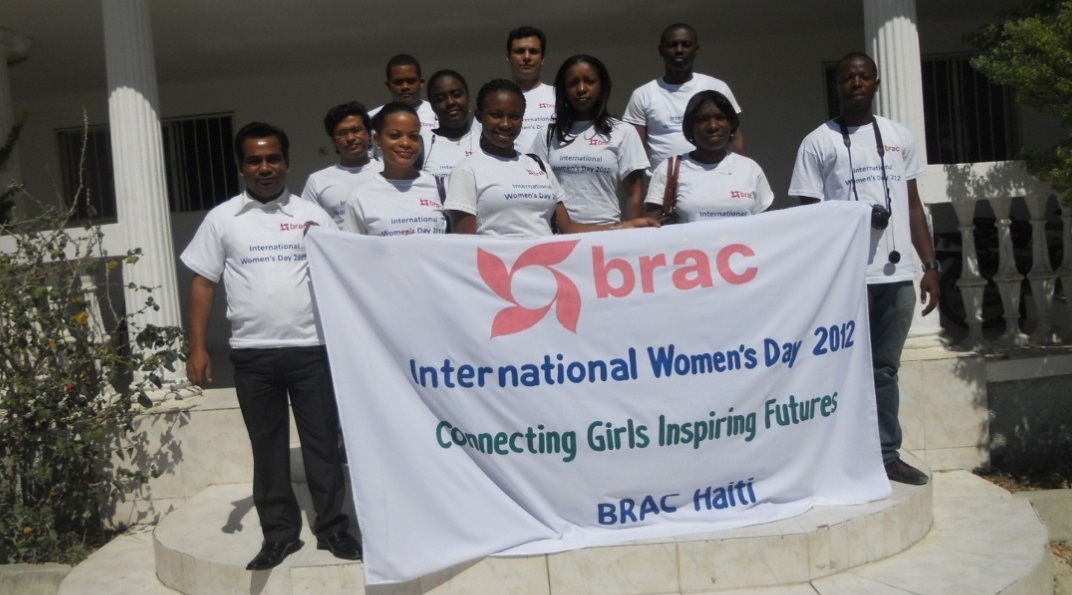
For the first time, BRAC Haiti staff celebrated International Women’s Day on 8 March 2012. Local and international staff from the Country Office and the Limb & Brace Center started the day by attending a women’s forum hosted by the Ministry of Women’s Affairs. The theme of the forum was to ensure the voices of Haitian women are included in the country’s reconstruction, and to advocate for the active participation of women in reconstruction efforts. Women’s groups and community-based organizations from all over the country participated in the event, along with business and civic leaders, and politicians, including President Michel Martelly and his wife, First Lady Sophia Martelly.
In the afternoon, staff gathered in the Country Office, where Country Representative Rakibul Bari Khan presented the latest data on the challenges women face locally and globally. Senior Education Officer Doris Valcin shared information on the plight of adolescent girls based on her participation in BRAC’s Global Learning Meeting. Finally, Jackson Naudé, Logistics Officer, highlighted the important role women play in Haitian society. Staff also watched a clip from the documentary film Poto Mitan: Haitian Women Pillars of the Global Economy.
Following the presentations, all staff discussed how BRAC Haiti can improve upon its gender inclusion and equality efforts. From that discussion, three suggestions emerged:
- Improve efforts to recruit and retain women.
- Increase and encourage discussions about gender issues with program participants.
- Respect and support women in their roles in the office and at home.
Through the end of the year, BRAC Haiti will monitor its progress in supporting gender issues.
BRAC releases star-studded musical album
 08 March 2012, Dhaka. Innovative collaboration features singers from BRAC’s Adolescent Development Programme.
08 March 2012, Dhaka. Innovative collaboration features singers from BRAC’s Adolescent Development Programme.
The largest Bangladeshi non-governmental organization is releasing a first of its kind musical album, featuring members of its Adolescent Development Programme. Containing nine tracks, the album is collaboration with top musicians from the country, including Arnob, Habib, Bappa, Balam, Fahmida Nabi, Kona, Labik,Palbasha and Sohini.
"It was a great pleasure working on this project with the girls. I hope they benefited from the experience of working in the recording studio. I wish them all the best!” said Balam.
Bappa also added “The album reflects the talent of these young girls. I feel privileged to be to be a part of this initiative”
The album, titled Nari (Bangla for ‘woman’) releases on International Women’s Day, 8 March. Every song relates the slogan “Connecting girls, inspiring the future”, the theme of this year’s celebration.
The Founder and Chairman of BRAC, Sir Fazle Hasan Abed recently at a speech on the occasion of the 40th anniversary re-affirmed his organisation’s ardent commitment to women’s empowerment during a gala which celebrated BRAC’s 40th Anniversary. “We have come far but we still have a lot to accomplish in the field of women’s empowerment. Once women realise their true potential, only then they will be able to write their own stories of success”, said Sir Fazle.
BRAC Director of Communications, Asif Saleh said that “BRAC is about realising potential of the people who have been excluded by the system. This album shows what these girls are capable of if given a chance.”
All major distributors of audio CD’s and all outlets of Aarong will sell the album throughout the country. The individual artists participating in the collaboration are also heavily promoting the launch.
The young women of the Adolescent Development Programme were featured in a reality TV show in 2009, titled Naache Gaane Number 1 as well as Meghe Dhaka Tara in 2011. These programmes were an initiative of BRAC to promote and inspire underprivileged adolescent girls from every corner of the country in participating in cultural and artistic events.
BRAC’s Education Programme opened the Adolescent Clubs giving girls the chance to socialise, play indoor games, sing, dance and exchange views and experiences-all activities that were frowned upon in their homes. It offers adolescents life skills based education- facilitated by their peers- on different social and health related issues. Livelihood Training courses are offered to girls to empower them financially. More than 8000 clubs are present in 57 districts reaching over 200,000 adolescents.
Watch "Revive": a song by BRAC adolescent girls
UK delegation visits Vision Bangladesh in Sylhet: More than 39,000 cataract operations performed since 2011
20 Feb 2012, Dhaka. Leading British Bangladesh business and community leaders visited Sylhet this month to see for themselves the incredible progress of the highly successful Vision Bangladesh programme – a joint initiative between BRAC and Sightsavers that aims to eradicate cataract blindness across the whole of Sylhet Division by the end of next year.
The programme is well on track to achieving this goal – having exceeded targets in 2011 and setting the standard across the country for large scale reduction of blindness in poor communities.
All members of the UK delegation have been active fundraisers and supporters for the programme; raising funds through their restaurants and businesses, making personal donations, and promoting the project through the Bangladeshi diaspora in the UK.
Mr. Monchab Ali, JP, Senior Adviser to the Vision Bangladesh National Committee, Proprietor of Bengal Dynasty Restaurants and long time supporter of the project was very moved by the experience:
“It is a great thing to see what people have donated towards to help poor patients who couldn’t pay themselves for such a life transforming operation.”
Dr. Musharraf Hussain, President of the Bangladesh Medical Association, UK, and supporter of Vision Bangladesh said:
“The surgeon and the whole team were extremely professional and competent. The infection rate is effectively zero because of the advanced self-sealing technique they use. It is very impressive.”
The group saw all the stages of the process from the outreach work in remote villages to reach the most isolated blind patients to an actual cataract operation at VARD eye hospital, Balanganj. The whole process is extremely quick with patients taken directly from screening camps to the hospital and back at home following successful surgery within 36 hours of diagnosis.
As BRAC Turns 40, Sir Fazle Hasan Abed Calls for Education Reform and Youth Development for Poor Countries
Outdated approaches to teaching must give way to modern schooling that prepares the poor for a 21st century knowledge society, says founder of the world's largest development organization.
2 March 2012, Dhaka. Sir Fazle Hasan Abed, founder of the world’s largest development organisation, BRAC, called for innovative solutions to address the needs of the burgeoning youth population in developing countries in an address delivered in February celebrating the 40th anniversary of BRAC.
As dignitaries gathered in Dhaka, Bangladesh, to celebrate BRAC’s 40th birthday, Sir Fazle, who founded the organisation in 1972, announced a new youth strategy as BRAC scales up operations in 10 African, Asian and Caribbean countries. He also called for doing away with “outdated approaches to teaching” in the developing world, calling most public education systems in the developing world unsuitable for preparing students for the 21st century knowledge society.
“You will be happy to learn that BRAC is in the process of developing a comprehensive strategy to help the vibrant, innovative and entrepreneurial younger generation of today to realize their potential, and be the agents of change within their communities,” Sir Fazle said.
The chairperson, who could not attend the gathering for health reasons but delivered the address via a spokesperson for the organization, called for education reform in poor countries. “Unfortunately, public education systems in most developing countries are unfit and unsuited to prepare our youth for the 21st century knowledge society that we must aspire to,” he said.
“Outdated approaches to teaching must give way to new techniques that teach our children not to memorize texts, but to think critically and solve problems creatively. We must give greater thought, and direct greater resources towards early childhood development, and social and emotional learning.”
BRAC is the largest secular, private education provider in the world, with over 5 million students having graduated from its alternative primary schools, dubbed “second chance” schools targeting those left behind by official educational systems. Sir Fazle has been hailed as an innovator in the field of education, winning the inaugural WISE Prize for Education in Qatar, styled as a Nobel for the field of education, last year.
In his speech, BRAC’s chairperson spoke of the “remarkable” progress of the organisation’s home country, Bangladesh, “in almost every major indicator of human development” over the last 40 years. “Today, the progress we have made is the envy of most of the developing nations in South Asia and beyond,” he said.
Infant mortality, for instance, has dropped from 200 per 1,000 live births to less than 50, and maternal mortality from 800 deaths per 100,000 live births to less than 200. Fertility rates have fallen dramatically as well: The average Bangladeshi mother now has just 2.7 children as opposed to 6.5 in 1972. Literacy rates have risen from 25 percent to over 65 percent.
“While it is true that no single organization can take credit for this amazing turnaround, we at BRAC can nevertheless take great pride in the role that we have played in support of governmental efforts to bringing about these successes,” says Sir Fazle. “From immunizing children to popularizing the use of oral rehydration therapy, from providing essential healthcare through a cadre of barefoot health volunteers to providing safe places for mothers to give birth, from curing tuberculosis to improving sanitation, BRAC’s work in public health has contributed to each of our country’s achievements in the health sector.”
Sir Fazle, who turns 76 this year, called on BRAC to remain a “trailblazing organization” as the leadership baton passes to a younger generation. “In these twilight years of my life, I feel a sense of comfort and satisfaction in knowing that we have an able and competent leadership team at BRAC,” he said. “I am confident that this team will ensure BRAC achieves even greater success and impact when I call time on providing leadership to this organization that I have built.”
A champion of girls’ education and the empowerment of women, Sir Fazle lamented the relative lack of progress in those areas. “Gender equality remains the greatest unfinished agenda not only of my life’s work but of our time. Although we have worked for the last 40 years to try to ensure that all citizens can live with dignity and respect and enjoy equal rights as human beings, I am sorry to say that patriarchy remains entrenched in our social and religious practices.”
Call for Write-ups and Reports: "BRAC Media Award on TB reporting - 2012"
01 March 2012, Dhaka. BRAC is announcing the Media Award to encourage Mass Media and recognize media activities in favor of National Tuberculosis Control Program. Interested Journalists from all seven divisions of Bangladesh are invited to send their published and/or telecasted write-ups or Television Reports on Tuberculosis along with a complete Bio-data and 2 (two) Passport size photographs. The write-ups or reports published and telecasted during the period January 2008 to December 2011 will be considered.
Download details (in Bangla)
Download bio-data form (in Bangla)
Faruque Ahmed on board as the new Deputy Executive Director, BRAC International
 01 March 2012, Dhaka. BRAC International is pleased to announce that Faruque Ahmed will be assuming the role of Deputy Executive Director of BRAC International from March 1, 2012. Prior to this, Ahmed was the Director of BRAC Health Programme for 10 years and played a critical role in shaping its overall health strategy. Under his leadership, BRAC Health Programme developed effective partnership with government, donors,other NGOs and private sectors and scaled up national programmes for Tuberculosis and Malaria control, and implemented innovative community based solutions like essential health care, maternal, neonatal and child health, nutrition, eye care and many other critical public health interventions in Bangladesh. He nurtured BRAC's health programme from a modest size to one of the largest in the world, managing several programmes with a reach around 100 million.
01 March 2012, Dhaka. BRAC International is pleased to announce that Faruque Ahmed will be assuming the role of Deputy Executive Director of BRAC International from March 1, 2012. Prior to this, Ahmed was the Director of BRAC Health Programme for 10 years and played a critical role in shaping its overall health strategy. Under his leadership, BRAC Health Programme developed effective partnership with government, donors,other NGOs and private sectors and scaled up national programmes for Tuberculosis and Malaria control, and implemented innovative community based solutions like essential health care, maternal, neonatal and child health, nutrition, eye care and many other critical public health interventions in Bangladesh. He nurtured BRAC's health programme from a modest size to one of the largest in the world, managing several programmes with a reach around 100 million.
Prior to joining BRAC, Ahmed worked for the World Bank. Ahmed is a member of the working group of Bangladesh Health Watch, a civil society initiative, Vice Chair of Bangladesh Country Coordination Mechanism for Global Funds for AID Tuberculosis and Malaria (GFATM) and a member of World Bank Civil Society Consultative Group on Health, Nutrition and Population. He also represented civil society on the GAVI Alliance Board and has represented BRAC in a number of national and international forums. A wide array of his writing on public health appears in international publications, and in 2011, Ahmed co-authored the book "Making Tuberculosis History."
He completed Masters in Health Sciences from John Hopkins University and Masters in Economics from University of Dhaka.
Mr. Ahmed has established himself in BRAC as a proven, highly creative and decisive leader and change agent.
His predecessor Dr. Imran Matin has decided to accept the role of Director of International Programme at Save the Children International in London. BRAC International thanks him for his dedicated contribution to BRAC for the past 11 years.
BRAC HRLS commemorates their 25th Anniversary: Seminar on Human Rights and Technology
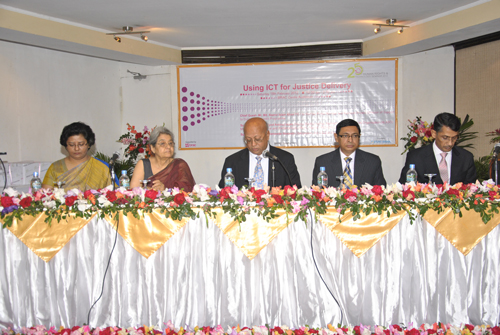
18 February 2012, Dhaka. BRAC’s Human Rights and Legal Aid Services Programme, the world’s largest NGO led legal aid programme, has sought a unique way to commemorate its 25th anniversary of operations through organising the first ever Human Rights and Technology Seminar in Bangladesh on Saturday February 18th 2012 between 10:00 am-2:00 pm at BRAC Centre Auditorium.
Mr. Ashfaq Hussain, Joint Secretary, Bangladesh Government and e-Specialist, Supporting Digital Bangladesh Project, to the Hon’ble Prime Minister’s Office will attend this event as the Chief Guest and Dr. Mahabub Hossain, Executive Director of BRAC will chair this event. Mr. Syed Aminul Islam, Director (District Judge), National Legal Aid Services Organization (NLASO), Ministry of Law, Justice and Parliament Affairs, Peoples Republic of Bangladesh and Dr. Hameeda Hossain, Chairperson, Ain o Salish Kendra (ASK) will be present as Special Guests.
The seminar intends to find avenues for exchange between the two different sectors that is, those involved in human rights and legal aid service delivery, and experts in technology so as to achieve maximum gains towards human development. This Seminar provides a platform for ICT for Development (ICT4D) with a very specific rights-based focus.
The joint initiative of BRAC HRLS and BRAC ICT, the software application called iCRESS (Integrated Collaboration and Emergency Support Services) will be demonstrated and shared in the seminar. This application provides a wide range of services to connect different end points of human rights service delivery operations. By using this software land entrepreneurs can send alerts and receive updates to HRLS at the Headquarter and HRLS is also able to monitor field operations in real time through tracking applications.
BRAC started its Human Rights and Legal Aid Services Programme in 1986 with an aim to provide access of legal education and legal aid services to the vulnerable and disadvantaged. Currently the programme operates 530 Legal Aid Clinics in 61 districts across the country.
Debate competition at national level
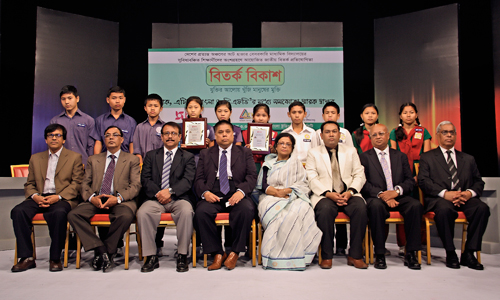
19 February 2012, Dhaka. A national debate competition was launched in the city at Bashundhara City aiming to facilitate the underprivileged secondary schools students to enable their inbuilt talents and skills to flourish. On 18th February Saturday a memorandum of understanding (MoU) was signed by BRAC, Debate for Democracy and ATN Bangla to start national level debate competition among 8,000 secondary schools in rural areas. Around 40,000 secondary school students will attend workshop and participate in the competition.
Education Secretary Dr Kamal Abdul Naser Chowdhury, Director General of Higher and Secondary Education Nomanur Rashid, ATN Bangla Chairman Dr Mahfuzur Rahman, ATN Bangla Senior Vice President Nowazesh Ali Khan, BRAC Executive Director Dr. Mahbub Hossain, BRAC Education Programme Director Dr. Safiqul Islam, BRAC Education Programme General Manager Dr Joya Sengupta, and Debate for Democracy Director Hasan Ahmed Chowdhury Kiron, among others, attended the MoU signing ceremony.
In his speech Education Secretary Dr Kamal Abdul Naser Chowdhury said that debate is a healthy competition. It creates logical attitude among the debaters. Debaters learn to study beyond their textbooks and also learn how to use information in proper way.
BRAC Executive Director Dr. Mahbub Hossain said that to have economic growth of our country we have to introduce beyond school-soft skills for our growing number of youth. By different initiative we have to focus on quality education in secondary level.
BRAC Education Programme Director Dr. Safiqul Islam mentioned that this is the fourth year of organizing this competition at national level and this year one third secondary school students of our country will participate in the competition.
BRAC celebrates its 40th Anniversary
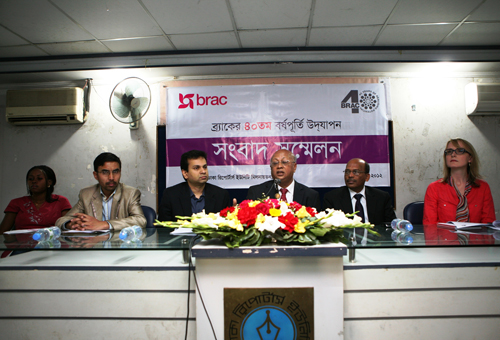
09 February 2012, Dhaka. Addressing the issue of youth unemployment, urban poverty and maternal mortality remains challenges of the future.
Vowing to continue with the mission of fighting poverty, BRAC is celebrating the 40th anniversary of its inception through reflection from the past to harness the potential for the future. In a press conference at the Dhaka Reporters Unity Auditorium today, Executive Director Dr. Mahabub Hossain said that BRAC’s success has largely been possible because of its innovative approaches towards development and its relentless pursuit of scale. He highlighted on some of the biggest innovations of BRAC and their contribution towards the national development. He cited the example of BRAC’s contribution to reduce child mortality significantly in Bangladesh from Diarrhea by visiting every single household in Bangladesh and teaching mothers how to use a simple formula of preparing Oral Saline. He also highlighted achievements in education where almost 5 million disadvantaged children got a second chance and graduated from its non formal primary schools. Similarly, he cited the success of giving a Bangladesh bank sanctioned seasonal, reduced interest loan with technical assistance to tenant formers. So far, almost 250,000 farmers, out of which 60,000 are women, have gotten this benefit and almost 400 crores taka has been disbursed. “When we saw that almost 15% of the extreme poor could not even get microfinance, we introduced a grant based technical assistance programme for them in 2002. Research conducted to analyze the effectiveness of the model shows over 1.3 million lifted themselves out of extreme poverty receiving support from this program.
Addressing the question of future challenges, Dr. Hossain said, “Although we are making tremendous stride as a nation. But problems remain. Tackling the issue of maternal death, nutrition deficiency, urban poverty and a holistic solution for opportunities for younger generation will be some of our future challenges,” said Dr. Hossain.
Chief Financial Officer, S.N. Kairy focused on BRAC’s transparency of financial records. He explained the various financial checks and balances that are currently in place. “BRAC is the only organization in Bangladesh which has the independent ombudsman to address concerns and complaints.” said Kairy.
The Director of Communications, Asif Saleh announced a series of events surrounding the 40thAnniversary events targeted towards reflection and discussion of the learning from past 40 years. There is a special event on February 10th showcasing various achievements and announcing of a forward looking agenda. Representatives of all 12 countries and friends of BRAC from all over the world will be present.
It will be followed by special awards and BRAC day for its employees and a CD launch with top singers to raise awareness on the issues concerning adolescent girls on International Women’s Day. A special international conference is being planned in October focusing on the south-south collaboration, MDG goal 8. Also its research wing is publishing a book on BRAC’s learning over the last forty years for the development practioners.
Representatives from BRAC’s operation in Uganda and Afghanistan, where BRAC is the largest NGO, Barbara Mirembe and Ghulam Mehdi also attended the press conference respectively. “The ideology of Sir Fazle Hasan in engaging local staff in its international programmes is undoubtedly effective and should serve as an example to other multi-national NGO’s,” said Mirembe. Both the operations have over 95% staff hired locally from those countries.
Founded as a rehabilitation mission in 1972 by Sir Fazle Hasan Abed in the aftermath of the Bangladesh War of Liberation, today BRAC has turned into one of the largest development organizations of the world operating in 10 other countries in Asia, Africa and the Caribbean touching the lives of almost 138 million people worldwide.
BRAC Education recipient of the TESOL President's Award 2012
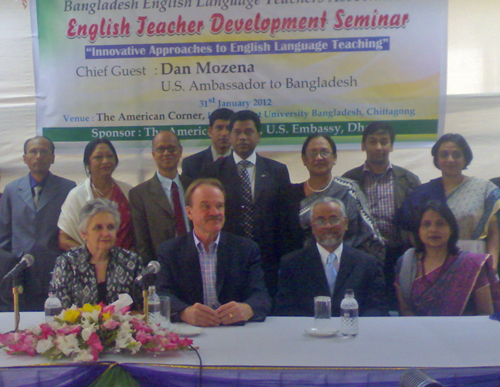
9 February, 2012, Dhaka. BRAC Education Programme, Post-Primary Basic and Continuing Education unit (PACE) has been selected as the recipient of the TESOL Presidents’ Award 2012. TESOL (Teachers of English to Speakers of Other Languages) honors the work of BRAC-PACE in promoting English language education and teacher training in Bangladesh.
TESOL International Association (TESOL) is a global education association representing more than 12,000 English language educators worldwide. The TESOL Presidents’ Award is selected annually by TESOL’s Executive Committee in recognition of individuals or entities who have supported efforts for the field in line with TESOL’s values. This year, the Executive Committee selected BRAC-PACE in recognition of its support for Education throughout Bangladesh, and in particular its promotion of English language teaching in primary, secondary and post secondary education.
The Presidential Plenary will be held on Friday, March 30, 2012 in the Grand Ballroom in the Convention Center in Philadelphia, Pennsylvania, USA.
Around 7,000 Head Masters & Assistant Headmasters received Management training, around 30,000 Secondary School Teachers received subject based training and around 15,000 Secondary School Management Committee (SMC) members received training on School Management & Administration from BRAC Education Programme, Post-Primary Basic and Continuing Education unit (PACE). The Objective of this training & workshops are to improve the quality of education of mainstream Secondary Schools in rural areas.
Join the world’s biggest family




